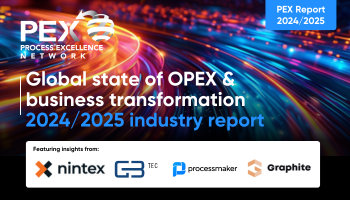Forrester examines the state of process intelligence
Amazon Business finds digital transformation is revolutionizing procurement processes while almost half of businesses plan AI-driven workforce cuts by 2030
Add bookmarkListen to this content
Audio conversion provided by OpenAI

PEX Network’s weekly news bulletin rounds up the latest research, reports and publications in operational excellence (OPEX), digital transformation, artificial intelligence (AI) and automation, business process management (BPM), process mining and process intelligence and more.
This week includes:
- Businesses increasingly adopting process intelligence tools
- AI still a “novelty” for UK Ministry of Defence
- Digital transformation, AI & data analytics revolutionize procurement processes
- Process mining’s transformative impact on manufacturing efficiency
- Almost half of businesses plan AI-driven workforce cuts by 2030
Don't miss any news, updates or insider tips from PEX Network by getting them delivered to your inbox. Sign up to our newsletter and join our community of experts.
Businesses increasingly adopting process intelligence tools
Research and analyst giant Forrester published The State Of Process Intelligence, 2024 report, examining the current landscape of process intelligence tools. The firm analyzed around 2,000 survey responses from technology leaders across industries, geographies and company sizes. It found that organizations are increasingly adopting process intelligence technology to improve their processes with many using federated models and centralized centers of excellence for efficiency. Businesses reflected a preference for embedded offerings but skill shortages and resistance to breaking down organizational silos remain significant challenges.
“Process intelligence tools are getting increasingly adopted enterprise-wide, mostly organized in a federated or centralized way,” commented Dr Bernhard Schaffrik, principal analyst at Forrester. “Compared to our last survey, embedded offerings are now preferred over standalone solutions mainly due to lower costs and better integration with automation tools.”
Watch Madison Lundquist, principal research lead at APQC, discuss team structures for process excellence
AI still a “novelty” for UK Ministry of Defence
AI is still considered a “novelty” or niche interest by the UK’s Ministry of Defence (MOD), the Defence Committee claimed in a new report. The Defence Committee, which examines the workings of the MOD, highlighted a gap between “rhetoric and reality” at the MOD where AI is often mentioned in public statements, but little progress is demonstrated in developing its use. “The report finds that the MOD has not provided a clear enough signal to industry on the type of AI the department is interested in acquiring or clear signposts for business opportunities,” the Defence Committee stated.
The report stated that the UK has natural strengths that could allow it to develop first-class specialisms in defence AI, but the sector is at present under-developed and needs cultivating. “The Committee calls on the MOD to identify the gaps in the UK’s Defence AI sector, including in digital infrastructure, data management and the AI skills base.”
Watch Tyrone Smith Jr, program faculty member/adjunct associate professor at University of Southern California (USC), reflect on prioritizing humanity in the age of AI
Digital transformation, AI & data analytics revolutionize procurement processes
Digital transformation, enhanced by AI and data analytics, is revolutionizing procurement processes with 64 percent of decision-makers prioritizing better insights to enhance operations. Socially responsible purchasing (SRP) is also becoming a central focus, as procurement teams take the lead on building sustainable and diverse supply chains. That’s according to the Amazon Business 2025 State of Procurement report. The study of 3,500 global procurement and organizational executives and managers found that while managing costs, efficiency and supplier relationships remain key challenges, procurement is increasingly empowering businesses to navigate a complex and dynamic environment.
However, only 46 percent of respondents stated that procurement is fully integrated into top decision-making forums, reflecting a clear disconnect between procurement leaders’ ambitions and their ability to act on them, said Amy Worth, director and general manager of Amazon Business UK. “While increased budgets present new opportunities, procurement teams need the tools and insights to navigate unexpected economic changes and streamline their operations to drive both immediate and long-term value.”
Watch Nao Anthony, senior manager in OPEX at Commonwealth Bank, and Tariq Munir, APAC financial planning transformation lead at PepsiCo, discuss the complexities and challenges of digital transformation
Process mining’s transformative impact on manufacturing efficiency
A new study explored how manufacturers can use process mining to uncover bottlenecks, streamline workflows and ensure adherence to compliance standards. It also examined utilizing process mining for yield monitoring and defect analysis, highlighting its potential to improve throughput, reduce production waste and achieve consistency in process execution across multiple factory lines.
“The practical implications are demonstrated through use cases such as field escalation resolution, compliance auditing and process commonality assessments, underscoring the value of process mining as a tool for continuous improvement,” wrote Puneet Malhotra. The findings of the research provide a framework for leveraging process mining to achieve a competitive edge in manufacturing by integrating real-time data insights, enhancing decision-making processes and fostering innovation in operational strategies. The paper, published by the Journal of Current Science and Research Review, concluded by outlining the transformative impact of process mining on manufacturing efficiency and product quality, paving the way for future advancements in smart factory technologies.
Register for All Access: Process Mining and Process Intelligence 2025
Almost half of businesses plan AI-driven workforce cuts by 2030
Almost half (41 percent) of employers intend to downsize their workforce as AI automates certain tasks, according to the World Economic Forum (WEF) Future of Jobs Report 2025. What’s more, 77 percent of the 1,000 global organizations surveyed are planning to reskill and upskill their existing workers between 2025 and 2030 to better work alongside AI, with 86 percent of employers expecting AI and information processing technologies to transform their business in the next five years.
“Trends such as generative AI and rapid technological shifts are upending industries and labor markets, creating both unprecedented opportunities and profound risks,” said Till Leopold, head of work, wages and job creation at the WEF. “The time is now for businesses and governments to work together, invest in skills and build an equitable and resilient global workforce.”
Watch thought leader Doug Shannon explore staff turnover amid AI adoption
READ MORE PEX RESEARCH & REPORTS NEWS
PEX Report 2024 global state of process excellence

PEX Network's annual report reveals the current state and future trends of process excellence. Based on a study profiling hundreds of global process excellence leaders, the report provides insights on how to leverage innovation, generative AI, and process intelligence to achieve operational excellence, customer-centricity, and organizational growth. Download your copy of the PEX Report 2024/2025 today and benchmark your process excellence journey against your peers.
Download Now













